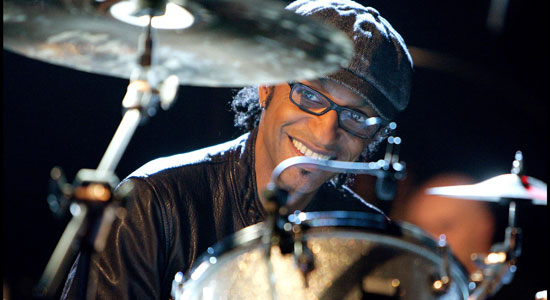
It’s the 31st annual Festival International de Jazz de Montréal. MAGNET’s Mitch Myers translates the action.
As the Montreal Festival ebbs and flows, so do I. The early part of this jazz week radiated low energy for me, but the musicians I saw perform still did their level best to entertain and inspire. Consider master drummer Manu Katché, here to host a few shows of his own as part of the vaunted Invitation Series after appearing as a guest of trumpeter Paulo Fresu. Leading his modest quartet for an early show at the Gesù Theater, Katché stood out as the obvious focal point in spite of the democratic nature of his group. The French-African Katché is not an overly showy percussionist, but his tasty, understated grooves have made him an in-demand player for the likes of Sting, Jeff Beck and a long, long list of other top-line artists. Along the way, Katché has put out a few CDs as a bandleader on the ECM label, the most recent being Third Round. While the musicians in his touring group are not the same ones that play on the new disc, his quartet sounded well-rehearsed. Essentially, pianist Alfio Origlio, electric bassist Laurent Vernerey and saxophonist Tore Brunborg were little more than adequate, but I kept my eyes on Katché for the whole time and was not disappointed. Over the course of the show, I began to understand what all of these great musicians see in Katché. He’s simply a great timekeeper and an imaginative drummer with a great amount of musicality to his playing. I’ll be interested to see him take up with some of the other talented musicians slated to join him as the week progresses. Odds are the opportunity for more experimental sounds will present itself, and some amazing improvisations are sure to follow.
After a killer feast in Chinatown, I returned to the Gesù (my second home) for a late night gig with the Wallace Roney Sextet. Roney, a trumpeter, is an interesting case. A child prodigy diagnosed with perfect pitch and taught by the likes of Clark Terry and Dizzy Gillespie before being mentored by Miles Davis, Roney has had his ups and downs. Now, at age 50, Roney is quite well established but working without much traction as younger, hipper jazz artists are attracting the attention (and gigs) he once enjoyed. The Gesù was not exactly filled to capacity for this show either, which I took as a bad sign. The band, which includes Wallace’s brother Antoine on saxophone, was workmanlike but never amazed. As far as Roney himself, it’s wild how much he tends to sound like mid-period Davis. He can’t help it, and he certainly is an inventive, talented soloist. Sadly, as a bandleader, I don’t see him as particularly challenging or all that inspiring. Still, when the rhythm section was cooking and Roney’s fiery trumpet blended in unison lines along with his two saxophonists, a few sparks did fly. It’s almost as if Roney is trapped in modern-jazz jail and doesn’t know what to do to get out. As with many noted musicians of his stature and talent, the responsibilities of keeping a band together and working can be a burden as much as it can be a joy. Like, what else is he supposed to do?
I’m not sure I know the answer to that one.






